“Like Loss Big”
It’s hard to translate the need to leave an Indonesian village for a grandmother’s deathbed half the world away
After thirteen months in Indonesia, I learn that my grandmother is suffering from advanced pancreatic cancer and has only a number of days remaining. Deciding to resign from the Peace Corps, I trade in my life as an English teacher in a Muslim village for the chance to see my grandmother one last time. In forty-eight hours, I will move from sudden goodbyes in the overcrowded heat of one home to premature hellos in Nashville’s air conditioned calm.
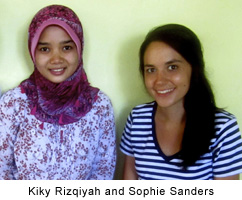 The news delivering begins with Kiky, my local confidante, almost an extension of myself in young Indonesian woman form, then moves to my neighbor, to my host family, to my school. There is no full understanding to be had, no sufficient consolation to offer. Kiky breaks our traditional greeting—a handshake and a cheek press—to reach in for a big, un-Indonesian, tear-filled hug. I keep telling her, and I keep telling myself, that for each sad friend in Java there is someone happy in Nashville, happy that I am homeward-bound. “I feel like my brain might erupt,” I tell Kiky, and a student nearby looks uneasy. “I’m confused,” I say, “but it is right, I know.”
The news delivering begins with Kiky, my local confidante, almost an extension of myself in young Indonesian woman form, then moves to my neighbor, to my host family, to my school. There is no full understanding to be had, no sufficient consolation to offer. Kiky breaks our traditional greeting—a handshake and a cheek press—to reach in for a big, un-Indonesian, tear-filled hug. I keep telling her, and I keep telling myself, that for each sad friend in Java there is someone happy in Nashville, happy that I am homeward-bound. “I feel like my brain might erupt,” I tell Kiky, and a student nearby looks uneasy. “I’m confused,” I say, “but it is right, I know.”
I’m leaving Wednesday; I need to prepare my bags. In robot mode, I’m pulling things out of the dresser, tossing them into home and donate piles, and talking out loud, “Take home. Donate. Donate. Donate. What am I doing? Donate. Keep going. Take home….” I come up with a giant pile of I-don’t-see-any-sense-in-transporting-this stuff. Once news has spread, the housekeeper and my host sister have at it like Muslims on the first Christmas morning they’ve never seen. “Really?” they say, “You no bring this?”
Because my passport is three hours away at the immigration office, I have no time to return to school before leaving. They solve the problem Tuesday evening, flooding right into the living room of my host family’s home. Teachers, students, administrators. I’ve never received such an outpouring of love. I see tears from those I wouldn’t have thought so affected; I get more well wishes, declarations of concern, and Indonesian apologies for imaginary wrongdoings than I could ever possibly deserve. Going home for my grandmother—that part is easily translated. No Indonesian would question the need to be present for a loved one’s pending death. But then comes the wondering about why I can’t return to them later, and I do my best to explain a perspective that doesn’t translate.
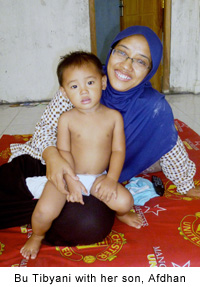 “This difficult explain,” I say in Indonesian. “Here like one world. There like world other. In both I feel at home. But if I go back to other world, later too hard for me return again.”
“This difficult explain,” I say in Indonesian. “Here like one world. There like world other. In both I feel at home. But if I go back to other world, later too hard for me return again.”
They kind of get it: “Ahhh, iya. We feel heavy very, lose Sophie. Like loss big.”
“Yes, me, too. Like loss big. Very sad, splitting. Everyone here sad; everyone there happy. Here feels like family, but there family too.”
“Ahhh, iya, iya…” they nod, and they get it perhaps as much as I can hope.
What is Peace Corps, this thing that has led me with puppet strings through village days and lesson plans and bowls of rice and bucket baths? It is not a marathon, not an extended Survivor episode to be fought through. It is a job that one steps into and a job from which one can step out. You’re on a journey, on a bus that feels like it will stop for nothing. But if at some point a sign points a passenger in another direction, then, by all means, the door can be opened, and the driver will kindly remind you that Peace Corps is but another vessel that can be stepped onto and off of as you see fit. One year can be enough; outside things can be of higher priority. I never imagined leaving, but suddenly I can’t stay.
It’s wonderful to know that one can mean so much to so many in such a small place. Later, looking out the plane window, I think of all the little villages past the lights of Surabaya, each little school just a dot on an island just a dot on the world. So many dots, so much love to offer. Plop a volunteer in the dot and watch the love tumble in.
I will never lose touch with Asembagus, but I feel like I have died in one place to move toward rebirth elsewhere. I’m forming, gradually, formed and re-forming, perhaps only to be formed and re-formed again.
Home will bring weirdnesses, too, I’m certain. A different kind of isolation in which I alone understand what there was in Indonesia, what I was while I was there, what home is, what I am now.
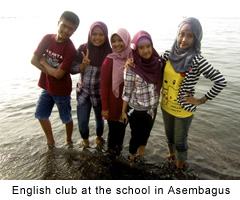 The moving sidewalk of Singapore’s terminals feels so technological, metallic, and uncomfortably swift that I have to move to the safety of the carpet and use my legs to walk human-paced through the remaining lengths. The airport is a shiny, varied, all-items-in-the-world monstrosity. One day it will be nice to know I have ready access to all these items, but right now I can only sit down. I have some trouble with the soap dispensers, some trouble turning a lamp on. I find myself saying, “What is the world?” and on the brink of beginning a philosophy book.
The moving sidewalk of Singapore’s terminals feels so technological, metallic, and uncomfortably swift that I have to move to the safety of the carpet and use my legs to walk human-paced through the remaining lengths. The airport is a shiny, varied, all-items-in-the-world monstrosity. One day it will be nice to know I have ready access to all these items, but right now I can only sit down. I have some trouble with the soap dispensers, some trouble turning a lamp on. I find myself saying, “What is the world?” and on the brink of beginning a philosophy book.
People seem so sophisticated at this gate, waiting. They are quiet, not staring, not making odd conversation. No one is smoking, squatting, spitting. No one is plucking facial hairs or picking things out of their teeth.
And the anonymity! A part of me looks around and thinks, Hey, don’t you want to look at me? I’m special, I’m interesting. But most of me thinks, Thank you, thank you for knowing I’m human. Thank you for not photographing my face with your phone.
The boy in front of me turns around to make casual conversation as we depart for Tokyo: “Where you headed?” He has a small-town Southern accent I know well. He’s from North Carolina, an hour south of Carrboro. He doesn’t ask where I’m coming from, praise Allah. I can’t manage a simple answer. My eyes are stuck in some so-tired, so-wide-open, so-overstimulated state.
I try to watch Top Chef in flight but really I’m watching my mind spin in circles. They are talking about omelets. That Southern accent is a seat away from me. There is no sign of frying oil. And, despite the fact that I need to be bathed in lotion now that I’m no longer sweating profusely on the equator, I am momentarily content.
Southern boy finally asks where I’m coming from. “So what, you in Singapore on business?”
“No, I was actually in Indonesia.”
“What for? Just visiting?”
“No, I’ve been there a year.”
“Oh, doing what?”
“I was in the Peace Corps, teaching English; now I’m coming home.”
Then, “So what are you gonna do when you get home?”
Dear God. I appreciate your accent. It’s wonderful, really. But you have got to stop asking me questions. Please stop. Please stop now.
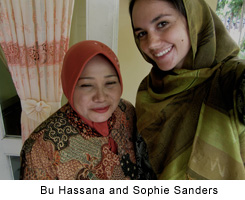 I half want to buy a snack in the Tokyo airport but I only walk in circles. Rupiahs are useless. The snacks seem odd. At site, I found small havens—certain people who, to a comforting enough extent, understood my character, appreciated my humanity: Kiky, my neighbor, the teachers in the school canteen. I could sit and feel as if nothing was expected, that I was not under observation. And now I’m feeling like the whole world is a haven, at least the world into which I’m stepping. I’m not the outsider; I’m just one among more ones. People are throwing around words like San Francisco, Florida Gators, Hilton Head. There are so many less babies! (Much less? Fewer? Many fewer? Much fewer?) And the water in the water fountain is so, so cold.
I half want to buy a snack in the Tokyo airport but I only walk in circles. Rupiahs are useless. The snacks seem odd. At site, I found small havens—certain people who, to a comforting enough extent, understood my character, appreciated my humanity: Kiky, my neighbor, the teachers in the school canteen. I could sit and feel as if nothing was expected, that I was not under observation. And now I’m feeling like the whole world is a haven, at least the world into which I’m stepping. I’m not the outsider; I’m just one among more ones. People are throwing around words like San Francisco, Florida Gators, Hilton Head. There are so many less babies! (Much less? Fewer? Many fewer? Much fewer?) And the water in the water fountain is so, so cold.
Now I’ve ordered a glass of red wine, and goodness is Delta liberal with the servings. It is absurd, really it is just crazy, that I can get this plentiful red wine for free on an airplane but must ride a bus six hours from site to Surabaya for an expensive wine bottle that, even in the capital, seems like it doesn’t really belong within Java’s bounds.
Now I imagine the plane dropping. I can’t help it. We are bumping. But I’m thinking that if I’ve felt anything within the past five days it’s that things are connected, little wheels getting things where they need to be in the world. And now I need to see my Grandma. I won’t not see my Grandma. I wait for smoothness. I know it will come.
In Java, they love what you are when you are there with them. They nurture it, shape it, form familial ties to it. But they can’t know the part of you that is not you when you are there, the part of you that’s subdued, even altered entirely, thanks to cultural norms, behavior patterns, communication lapses, and understandings that, at the end of the day, have deep and different roots.
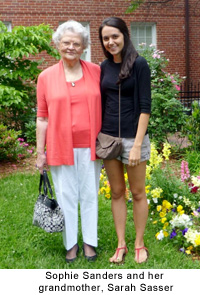 I could shape a family out of relationships I had there. Hands down, no question, I could choose a Bapak, an Ibu, a sister, a best friend. I could love them, appreciate them, fulfill certain roles for them. But that can never change the fact that I have a family—a mother, a father, brothers and sisters. And those in my Indonesian village, busy growing attached to their perception of me, cannot understand my perspective. They have never been dropped, alone, into a society carrying on in ways so different from their own.
I could shape a family out of relationships I had there. Hands down, no question, I could choose a Bapak, an Ibu, a sister, a best friend. I could love them, appreciate them, fulfill certain roles for them. But that can never change the fact that I have a family—a mother, a father, brothers and sisters. And those in my Indonesian village, busy growing attached to their perception of me, cannot understand my perspective. They have never been dropped, alone, into a society carrying on in ways so different from their own.
The plane on the moving map touches the western tip of Alaska. The Spanish image says Mar de Bering and Estados Unidos. Languages. So many! The English image shows yellow dots on Alaskan cities. Fish Village. Mountain Village. Maybe America and Java are not so different after all.
The Detroit airport is a quiet igloo. People are calling me darling, sweetie, honey. “And what was the purpose of your trip to Indonesia?” says Mr. Immigration.
“I was in the Peace Corps.”
“Well, welcome home, sweetie.” I’d smile in response if I had any connection to my brain right now.
Nashville is so simple, so clean, so like a storybook. We might as well touch down on a bed of broccoli; I’ve never seen so many tree tops in all of my life. The Delta employee tells me to have a blessed day after he tracks my lost luggage. Tracking that luggage was ten thousand million times easier than doing anything, ever, in an Indonesian bank.
My father picks me up, and we make it to the house without seeing any other people on the roadside. There are no locals sitting, watching, hanging, eating. It’s only calm, noiseless. So free of interruptions, of chaos, of people packed tight.
Everything is cold. Me, the dishes. My breakfast spoon is heavy. The milk is good but uncomfortably cold. The air is a quiet coldness; if I weren’t freezing to death I’d take advantage of the fact that I’m free now to wear a tank top.
Mom calls. She’s with my grandmother in Alabama. “This morning Grandma asked where her doll is,” she says, explaining that Grandma has become more child-like. “Your doll?” Mom asked her.
“You know,” Grandma said. “Sophie!”
And I’m assured that I’ve done what is right. Those I left in Java say, “Yes, if Allah wants it.” And maybe it’s not Allah, but something, somewhere, making it so.
Copyright (c) 2013 by Sophie Sanders. All rights reserved. Sophie Sanders is a graduate of the Harpeth Hall School in Nashville. She has a B.A. in Psychology and Anthropology from the University of North Carolina in Chapel Hill. She now lives in Nashville and is pursuing writing in various forms.


